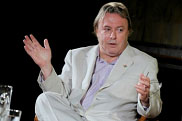Crying freedom
Dec 17th 2011, 19:21 by E.F.

CROSSING an Athens street by foot on a warm spring afternoon in 1985, I checked a taxi waiting at the light to make sure it was not going to jump the red. In the back seat I spied the unmistakeable figure of Christopher Hitchens, larger than when I’d last seen him, larger than anyone in their mid-30s ought to be, made larger still by an unnecessary overcoat thrown over the shoulders in the manner of a ballet impresario from an earlier time. He saw me, called my name, threw open the door and stepped into the street. The light was now green and traffic was hooting. Heedless as ever to context but wholly in role, he let go an uncounted shower of drachma notes into the grateful driver’s hand and greeted me theatrically with a kiss on both cheeks. Like me, he was in Athens to write about the Greek elections. The previous day, Andreas Papandreou—the father of the recently replaced prime minister—had handily won a second parliamentary term as leader of his country’s Social Democrats. Though not like me, because Christopher was not like other journalists. “I didn’t see you at the Press centre last night,” I said. “No,” he replied, “I was at the Papandreous.”
How the next hours unfolded, I don’t recall. I do vividly remember that around two in the morning, Christopher was entertaining a small group of us at a restaurant—quoting, parrying, recounting, provoking. His speed of memory was daunting. He always seemed able to cite what an opponent in argument had said or written years earlier, deploying it quickly and wittily at the surest moment to expose them as fools, ditherers or hypocrites. That essentially 18th-century skill made him as lethal on television as he was on the page. He wrote the way he spoke, in boutades and in paragraphs, often with a blood-level of alcohol that would leave most of us speechless. He was catholic in his love and knowledge of the written word, but on the whole stayed off movies, theatre, visual arts and music. Had he a trace of Puritan suspicion that such arts were elite, effete and not morally serious? I suspect it was more that each of those arts has its standards of performance and he was a performer in a competing medium—his own words. You had to hear him in real time, and I rate myself lucky that on a few occasions I did hear him at table—usually late on when everyone else had stopped talking, not because they were silenced or bested but because there and then it was simply more satisfying to listen to him.
I don’t know, and who does, if his copious writing will stand up in the way that the work of his politico-literary hero George Orwell has stood up. Those who found little to admire or agree with in Christopher, especially after he backed the Iraq War in 2003, will laugh at the comparison. Even those who enjoyed his overflowing talents as journalist and talker may find it a stretch. Differences of water level and achievement stand out. Yet there are likenesses, too. Neither could tolerate camps, least of all their own: like Orwell, Christopher kept his harshest barbs for the left. Neither were doctrinal and, though Christopher took on big topics—notably religious belief, of which he claimed to have none—his small-motor skills with tricky ideas were no finer than Orwell’s. Neither were really interested in policy or government, though from sheer forensic bravado Christopher would happily take on the best-briefed wonk. Both wrote from an essentially emotional perception about the moral condition of the world. Orwell once praised Charles Dickens for the “vagueness” of his radicalism. He did not mean evasiveness or lack of clarity, but a deep conviction that something was wrong with society and that the only constructive suggestion was: “Behave decently”. Christopher’s constructive suggestions were never so clear, but his negative drive was unmistakeable and gave him a consistency his detractors wrongly said he lacked: locate power, distrust it and take it down a peg, even if you can’t knock it off its perch. Odd as it sounds, somewhere in Christopher was a backwoods Tory anarchist.
Status and power fascinated him as targets, not as ways to discrimate among people. He was open to everyone and called all comers by first name—that memory again!—even if they were not near friends. My calling him “Christopher” repays the compliment. “Hitchens” would sound both too distant and too knowing.
Now I think about it, at that restaurant in Athens it was probably closer to three in the morning. Holding up an empty bottle, Christopher waved it back and forth to get the attention of a waiter, slumped against a far wall. When the waiter came over with a fresh bottle, Christopher raised an empty glass to him and cried with a Byronic flourish, “Eleftheria!”—which means freedom or liberty in Greek. In perfect English the waiter shot back, “We’ve already got that”. The exhausted man had made his point and for once Christopher had no comeback. He’s silent now for good, and, agree with him or disagree, it’s a loss to us all.
热门推荐:
考研网校哪个好
新东方考研培训班
考研培训班
考研培训机构哪个好
考研英语网络课程
文都考研网校
北京考研培训班

